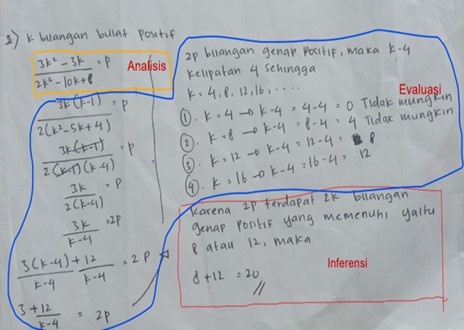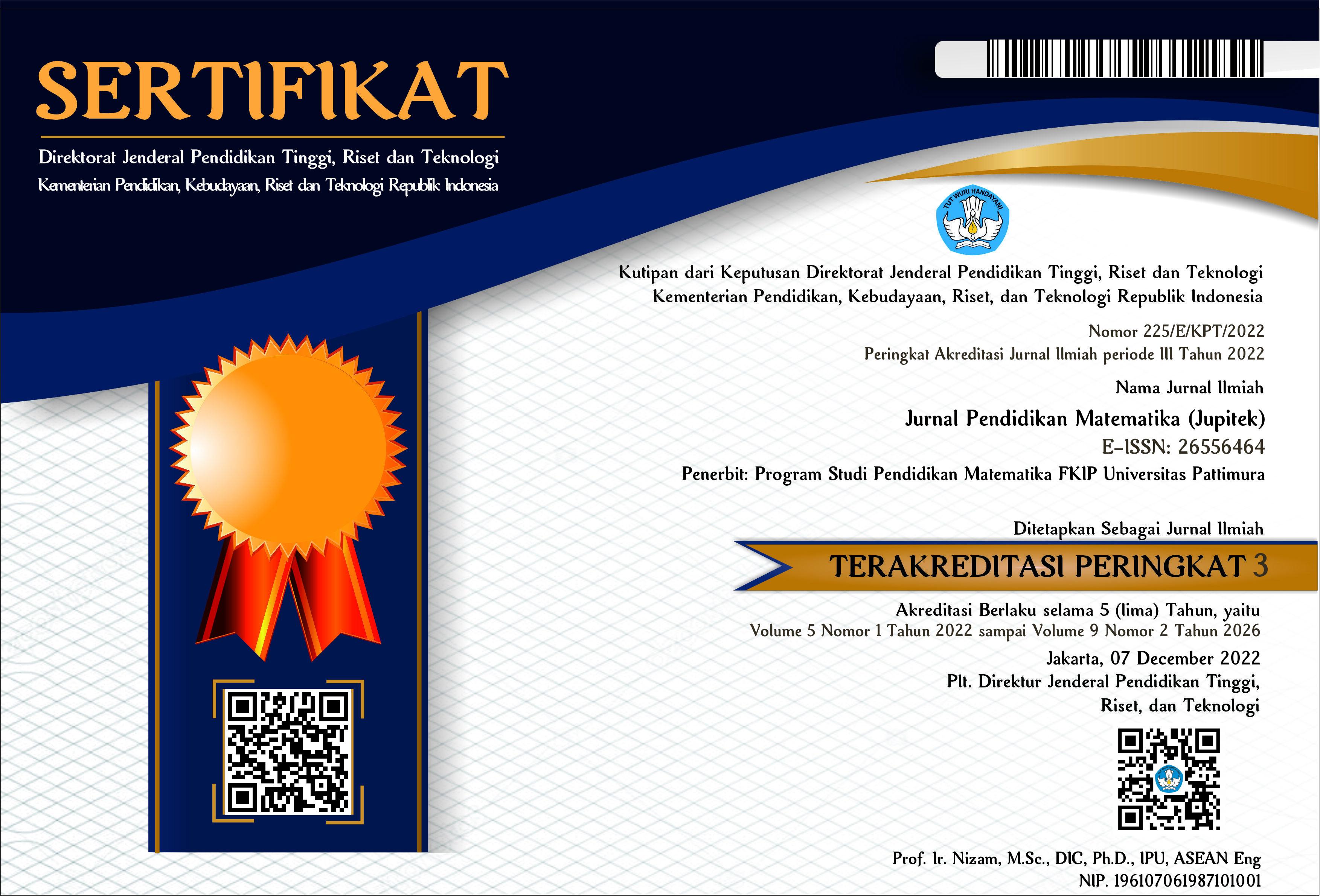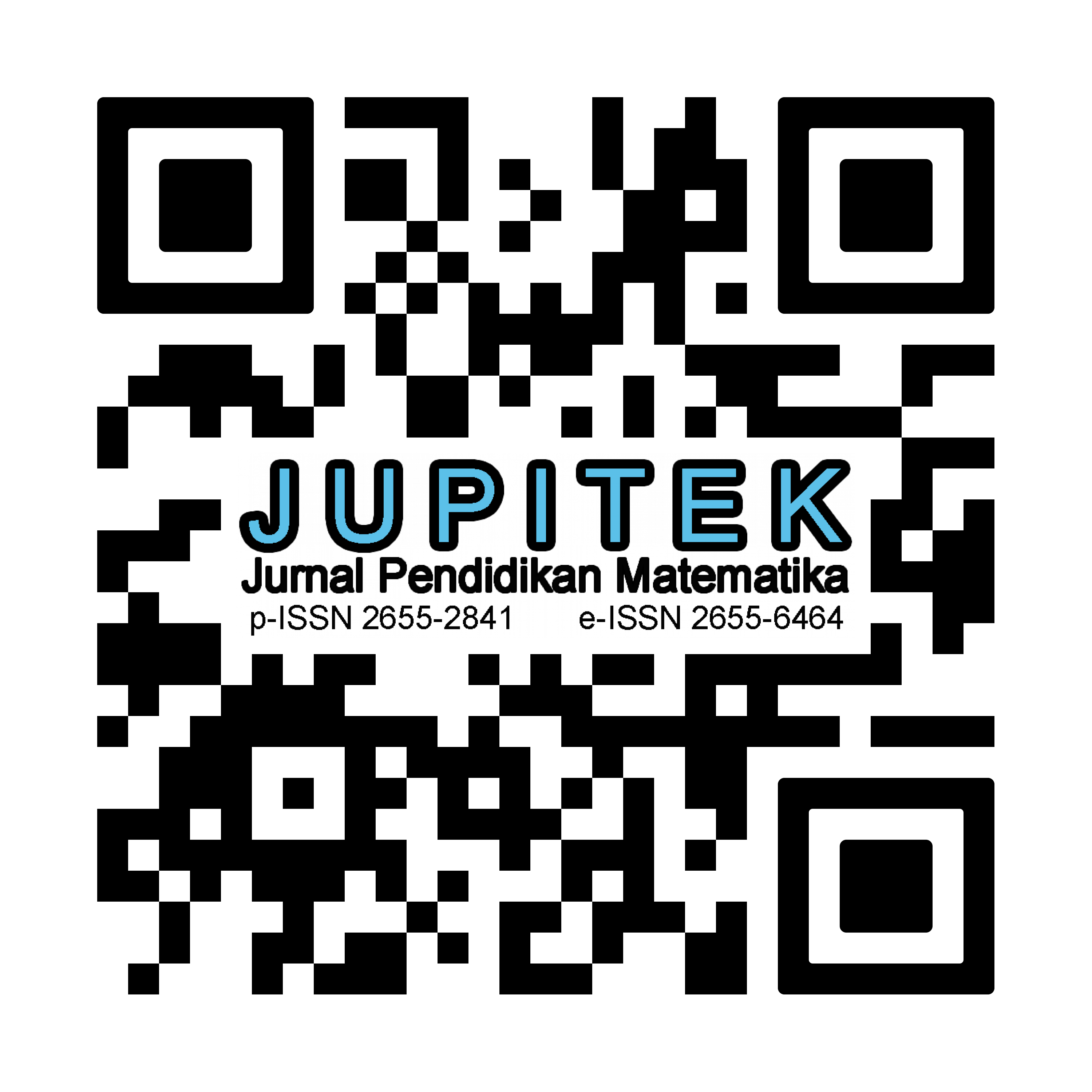CRITICAL THINKING ABILITY OF JUNIOR HIGH SCHOOL STUDENTS IN SOLVING MATHEMATICS QUESTIONS OF THE NATIONAL SCIENCE COMPETITION
Abstract
Critical thinking ability is the ability to identify problems, evaluate and develop arguments and solve problems appropriately. Critical thinking must be mastered as a fundamental ability that students must possess. One strategy that can develop students' critical thinking skills is giving problem-solving tasks, such as KSN questions. The KSN questions have more complex problems and a very high difficulty level. This study aimed to measure students' critical thinking in solving the problems of the National Science Competition (KSN) in the field of Mathematics. This research is qualitative descriptive research. The research subjects were three 8th-grade students who were members of the competition team of Public Junior high School 3 Siak Kecil. The data collection technique was in the form of a written test to measure students' critical thinking skills. The results showed that students had good mathematical critical thinking skills. Overall, students can investigate the context of the problem (interpretation), model or formulate mathematical problems (analysis), develop answer concepts by applying appropriate strategies (evaluation), and write conclusions (inference). The results of the data analysis concluded that of the three students who took the test, S-1 had excellent critical thinking skills
Downloads
References
Aisyah, S., & Kurniawan, M. A. (2021). Penggunaan Media Pembelajaran Daring pada Masa Pandemi COVID-19. Jurnal Riset Madrasah Ibtidaiyah (JURMIA), 1(1), 48-56.
Arif, D. S. F., Zaenuri, Z., & Cahyono, A. N. (2020). Analisis Kemampuan Berpikir Kritis Matematis Pada Model Problem Based Learning (PBL) Berbantu Media Pembelajaran Interaktif dan Google Classroom. In Prosiding Seminar Nasional Pascasarjana (PROSNAMPAS) (Vol. 3, No. 1, pp. 323-328).
Arif, M., & Hayudiyani, M. (2017). Identifikasi kemampuan berpikir kritis siswa kelas x tkj ditinjau dari kemampuan awal dan jenis kelamin siswa di smkn 1 kamal. Jurnal Ilmiah Edutic: Pendidikan dan Informatika, 4(1), 20-27.
Budiyono, B. (2008). Kesalahan mengerjakan soal cerita dalam pembelajaran matematika. Paedagogia, 11(1), 1-8.
Choy, S. C., & Cheah, P. K. (2009). Teacher Perception of Critical Thinking Among Students and Its Influence on Higher Education.International Journal of Teaching and Learning in Higher Education, 20(2), 198—206. Retrieved from http://www.isetl.org/ijtlhe/pdf/IJTLHE336.pdf.
Febianti, Grahani. (2012). Perbandingan Peningkatan Kemampuan Pemecahan Masalah Matematis Antara Siswa yang Memperoleh Pembelajaran Melalui Pendekatan Anchored Instruction dan Pendekatan Problem Posing. Skripsi FPMIPA UPI. UPI Bandung: tidak diterbitkan
Fristadi, R., & Bharata, H. (2015). Meningkatkan Kemampuan Berpikir Kritis Siswa Dengan Problem Based Learning. Prosiding Seminar Nasional Matematika Dan Pendidikan Matematika UNY, 597–602
Johnson, E. B. (2010). Contextual teaching and learning: Menjadikan kegiatan belajar mengajar mengasyikkan dan bermakna (Terjemahan Setiawan Ibnu). Bandung: Kaifa (Buku asli diterbitkan tahun 2002).
Latifah, I. W., Susanto, S., Sugiarti, T., Fatahillah, A., & Murtikusuma, R. P. (2018). Profil Berpikir Siswa Peserta Olimpiade Matematika dalam Menyelesaikan Masalah Aljabar. Kadikma, 9(2), 145-154.
Lambertus, L. (2009). Pentingnya melatih keterampilan berpikir kritis dalam pembelajaran matematika di SD. In Forum Pendidikan (Vol. 28, No. 2, pp. 136-142).
Masrukan, & Sulistani, E. Pentingnya Berpikir Kritis dalam Pembelajaran Matematika untuk Menghadapi Tantangan MEA. Prosiding Seminar Nasional Matematika X, Universitas Negeri Semarang, Hal. 605-612
Ovy Anindiyah Rochman. (2019). Analisis Berfikir kritis Siswa OLimpiade Matematika Dalam Menyelesaikan Soal OSN Materi teori Bilangan. Skripsi Unpublished. Universitas Keguruan dan Ilmu Pendidikan Jember. (https://repository.unej.ac.id)
Sari, N., Indiati, I., & Endahwuri, D. (2020). Analisis Kemampuan Berpikir Kritis Matematika Siswa ditinjau dari Pemahaman Konseptual dan Pengetahuan Prosedural. Imajiner: Jurnal Matematika Dan Pendidikan Matematika, 2(6), 467-472.
Sianturi, A., Sipayung, T. N., & Simorangkir, F. M. A. (2018). Pengaruh model problem based learning (PBL) terhadap kemampuan berpikir kritis matematis siswa SMPN 5 Sumbul. UNION: Jurnal Ilmiah Pendidikan Matematika, 6(1).
Subekti, E. E. (2012). Menumbuh kembangkan Berpikir Logis dan Sikap Positif terhadap Matematika melalui Pendekatan Matematika Realistik. Malih Peddas (Majalah Ilmiah Pendidikan Dasar), 1(1), 1–11.
Susanto, A. (2013). Teori belajar dan pembelajaran. Jakarta: Prenadamedia Group.
Utami, R. W., & Wutsqa, D. U. (2017). Analisis kemampuan pemecahan masalah matematika dan self-efficacy siswa SMP negeri di Kabupaten Ciamis. Jurnal Riset Pendidikan Matematika, 4(2), 166-175.

Copyright (c) 2022 Ari Malinda, Yenita Roza, Maimunah Maimunah

This work is licensed under a Creative Commons Attribution-NonCommercial-ShareAlike 4.0 International License.
License and Copyright Agreement
By submitting a manuscript to Jurnal Pendidikan Matematika (JUPITEK), the author(s) certify and agree to the following terms:
- Originality and Authority: The submitting author is authorized by all co-authors to enter into this agreement. The manuscript describes original work that has not been published previously in a peer-reviewed journal, nor is it under consideration for publication elsewhere.
- Approval: Its publication has been approved by all author(s) and by the responsible authorities of the institutions where the work was carried out.
- Rights: The authors secure the right to reproduce any material that has already been published or copyrighted elsewhere.
- Licensing and Copyright: Authors retain the copyright to their work.
- License Grant: The authors grant Jurnal Pendidikan Matematika (JUPITEK) the right of first publication, with the work simultaneously licensed under the Creative Commons Attribution-NonCommercial-ShareAlike 4.0 International (CC BY-NC-SA 4.0).
- Self-Archiving: Authors are permitted and encouraged to deposit the published version of their article in institutional repositories, on their personal websites, and other academic platforms, with proper acknowledgment of its initial publication in Jurnal Pendidikan Matematika (JUPITEK).





.png)


